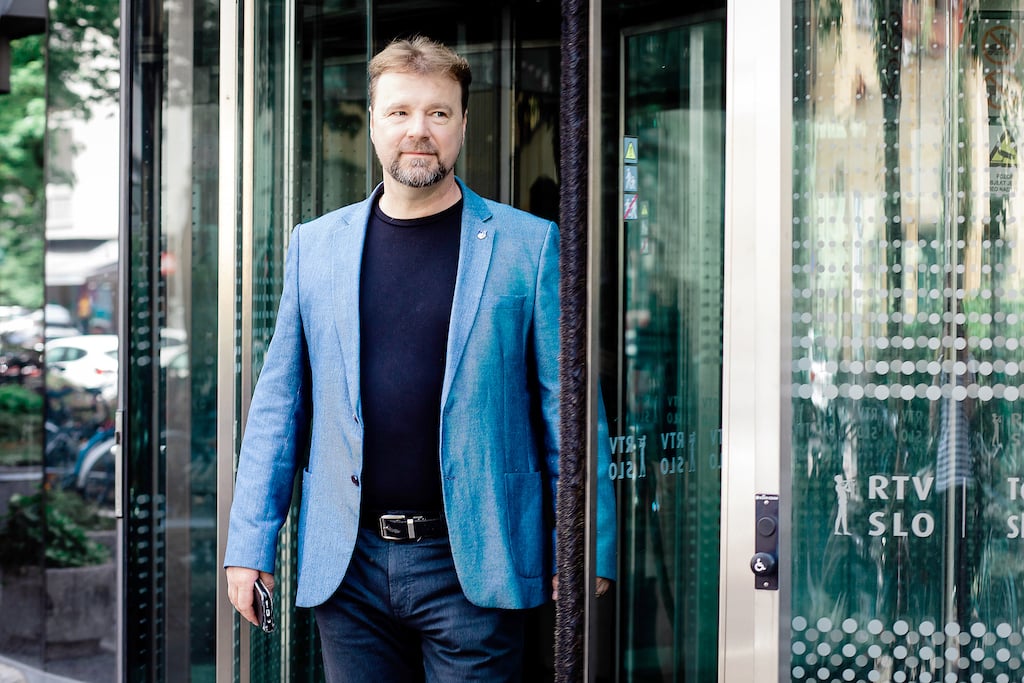“Freedom” seems to have started showing its teeth ever since the complete politicisation of the public media outlet Radio-Television Slovenia (RTVS) under the guise of depoliticisation has happened. After the unanimous dismissal of the last disturbing element, Uroš Urbanija, from the post of Acting Director of Television Slovenija, it seems that the intimidation of journalists who are not part of the group of those who there is “f*cking more of” has begun. Among the latter is also the long-standing journalist Jože Možina, editor of the show Interview (Intervju) on RTVS.
“Today, two uniformed police officers came looking for me at RTV, as the editor of the show Interview. Is this called intimidation, political pressure on a journalist, the road to dictatorship, an attack on freedom of speech… or is there another term for it? Is this the new standard of FREEDOM at RTV Slovenia?” read Jože Možina’s critical response to Thursday’s action at RTVS that he published on Twitter.
Možina has long been a thorn in the side of those who want to make the space in the public media only available for the chosen few. This is because he invites those who, among other things, dare to speak out on taboo topics, such as the post-war killings, and those who think differently from the left and the mainstream media subordinate to it, to his show and gives them space to speak about such things publicly.
The police insist that this is not intimidation or political pressure
The police did not answer Možina’s question about their visit to the national media outlet, but he noted that the police had given an answer to the newspaper Slovenske novice (Slovenian news). The Ljubljana Police Directorate pointed out that, in order to comply with the provisions of the Personal Data Protection Act, they could not answer the question concerning specific natural persons, adding: “However, we can clarify that police officers perform their duties in accordance with the law, which includes communicating with persons who may be involved in police proceedings as persons with different statuses. The case in question, therefore, does not involve any intimidation, political pressure or the like, but merely the basic performance of police duties.”
The spokesperson of the Ljubljana Police Directorate also pointed out that “public announcements like this one (by journalist Možina) would, in fact, put pressure on police officers who deal with various cases that have a high public profile.” As she stated, the police are independent and professional in their work and will carry out their duties despite “such pressures”.
“This is a political story”
As for the police response, Možina said that this is where things really get more complicated. “They replied that these are supposedly just normal procedures – that a police officer comes looking for you in your house, and that what I was doing was putting pressure on the independent work of the police. It is clear that this is a political story,” emphasised Možina.
He also said that he is not aware of any previous cases where the police came to RTVS to look for a journalist. We decided to ask the police how many times uniformed police officers have searched a journalist’s house before, in which cases, and who it was that they were after.
We are publishing the police’s response in its entirety below:
“Dear Sir or Madam,
In view of the provisions of the Personal Data Protection Act, we are unable to answer your questions relating to specific natural persons. We also do not keep statistics in a way that would tell us how many times police officers have searched for persons in a particular place.
However, we can clarify that police officers carry out their duties in accordance with the law, which includes communicating with persons who, as persons with different statuses, may be involved in police proceedings. Thus, the case at hand does not involve any intimidation, political pressure or the like, but merely the basic performance of police duties.
In recent times, we have repeatedly observed that similar public announcements are actually used to put pressure on police officers dealing with various high-profile cases. Let us stress here that the police are professional and independent and will carry out their duties in accordance with the law, regardless of such pressures.”
“I will not be intimidated,” Možina told us, adding that he hoped that such developments would not have a bad effect on his younger colleagues. We have also asked the Association of Journalists and Publicists and the Slovene Association of Journalists to comment on the case. We will publish the comments at a later date – once we have received them.
N. Ž.


